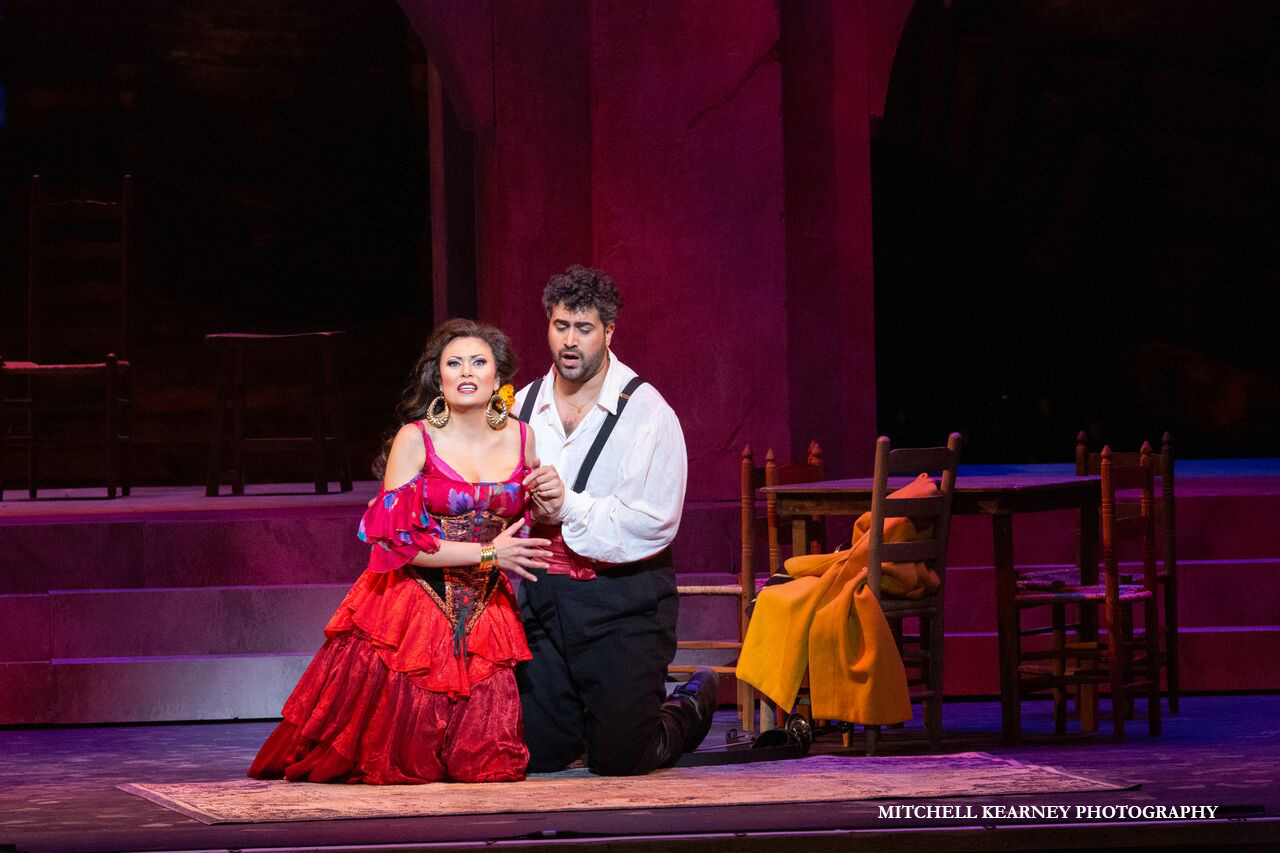The relationship between Opera Carolina and Carmen is very much like the pivotal relationship Georges Bizet’s masterpiece depicts between Corporal Don José and the wily, seductive, dancing, smuggling, freedom-loving cigarette girl who ruins him. Intense attraction and staunch resistance are both in play. At the tenth opening night of Carmen in the company’s 71 seasons, Belk Theater was predictably filled to near-capacity despite the sloppy weather. Only the most distant seats in the topmost balcony had been spurned, testifying to Carmençita’s enduring appeal. Companies need that kind of response to maintain production quality and to thrive. Yet to stay vibrant, they must also venture beyond the tried-and-true warhorses – and when they return to them, there’s an unspoken imperative to make them fresh. Yesterday’s attitudes, divas, and designs will not do.
Directed by Jeffrey Marc Buchman, in his Charlotte debut, the current production brings Carmenback after a longer-than-average hiatus of nine years. As a centerpiece of what Opera Carolina is calling their “She Season” – and on the night of the third annual Women’s Marches across the nation – the slant was certainly fresh. So was the cast: no less than eight of the guest artists were making their local debuts, and for New York soprano Alyson Cambridge, this was her debut in the title role. Artistic director James Meena was in the pit conducting a generous contingent from our Charlotte Symphony Orchestra, and his zest for the score was evident from the opening bars of the overture. Colorful costumes by AT Jones were further accented by the choreography of Rosa Mercedes, and the work of the Opera Carolina Chorus was pleasantly augmented by the Choir School at St. Peter’s.
Perhaps the necessity of moving those kiddie choristers on and off the stage inhibited Buchman and his principals in the opening scene, for the staging was rather static and flavorless. People of Seville hardly moved in the city’s public square, only one of the singing soldiers was smoking as prescribed in their lyrics, and the projected background for Annabelle Roy’s set suddenly changed with the entrance of Micaëla and repeatedly shifted afterwards while the location remained the same. Cambridge’s “Habañera” was ominously tentative, and tenor Dario di Vetri‘s sincerity seemed thwarted by something lodged in his throat. When the altercation between Carmen and Manuelita erupted, the heroine’s arrest and binding didn’t turn up the energy or the sensual heat as it should. Carmen’s escape to close Act 1 was similarly torpid, almost embarrassing, with di Vetri’s failing to fall as planned.
Yet Cambridge had already lit a spark in this performance with the wanton seductiveness her “Seguidilla” come-on. Her spitfire allure reached full bloom shortly afterwards at the start of Act 2 when she, Alicia Russell as Frasquita, and Christine Amon as Mercédès sang their Gypsy song. Orchestra and percussion from the pit irresistibly prodded the “Chanson Bohème” to a torrid pace and fury, and I began to suspect that Cambridge’s dancing talent was as good as we will ever find in an operatic Carmen. Baritone Alex Lawrence‘s visitation as Escamillo was slightly underpowered for a charismatic toreador but not enough to dampen the fire. When Don José followed closely upon Escamillo’s exit, seeing Carmen for the first time after his two months’ punishment for letting her escape, Cambridge had already shown us that she was almost as ardently eager for the reunion as he was. And what a reward she delivered! Cambridge’s wordless dance for José proved that less is more when Carmen herself plays the castanets. No less pleasing, di Vetri was remarkably recovered from what had ailed him in Act 1, giving us a fairly stunning account of José’s “Flower Song” in response to Cambridge’s cruel taunting and teasing.
As Micaëla, José’s modest hometown discard, soprano Christina Pier threatened to emerge as the best voice onstage when she came looking for her beloved in the opening scene – not a desirable outcome. But Pier remained sweet and solid in Act 3 after the principals had rallied, delivering word to José of his mom’s impending death poignantly enough for the tenor credibly to tear himself away from the spellbinding Carmen. In terms of delivering on a feminist #MeToo interpretation, Buchman was probably strongest here, for we saw José emphatically crossing the line into abuse before parting with Carmen after the first of her multiple and decisive rejections, with some definite piggishness in di Vetri’s possessiveness.
Yet Cambridge’s spirit never appeared to be subdued. Instead of sounding hesitant and fearful in response to Frasquita’s and Mercédès’ cautions in Act 4, when the disgraced José is spotted stalking her outside the Seville bullring, this Carmen was determined and defiant. Once again, lighting designer Michael Baumgarten pulled the trigger too often with changes in his projections during the denouement, and Buchman firmly established that he needs to hire a fight choreographer when the action heats up, but neither of these failings daunted Cambridge or di Vetri in their tragic final encounter. Unable to control himself, he surrendered to his impulses one last time before the curtain fell. What was different this time around was the sense that she was the victim here, not he. With all of Cambridge’s spitfire arrogance and provocation, compounded by her caprice, you could argue the point. Nevertheless, Buchman has succeeded in changing the conversation.
Opera Carolina’s Carmen will repeat Thursday, Jan. 24. See our sidebar for details.
Written by Perry Tannenbaum


